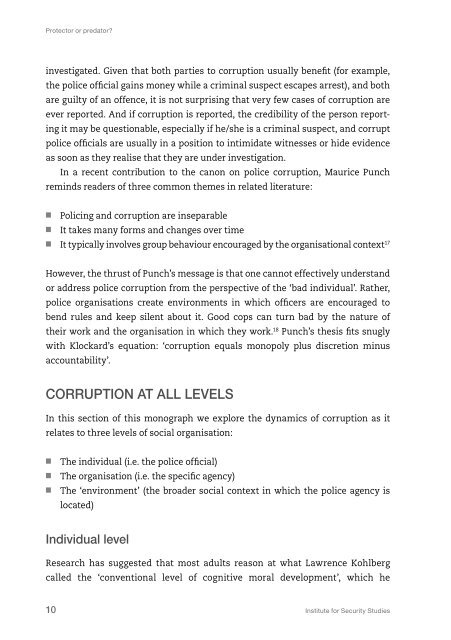Protector or predator? - Institute for Security Studies
Protector or predator? - Institute for Security Studies
Protector or predator? - Institute for Security Studies
You also want an ePaper? Increase the reach of your titles
YUMPU automatically turns print PDFs into web optimized ePapers that Google loves.
<strong>Protect<strong>or</strong></strong> <strong>or</strong> predat<strong>or</strong>?<br />
investigated. Given that both parties to c<strong>or</strong>ruption usually benefit (f<strong>or</strong> example,<br />
the police official gains money while a criminal suspect escapes arrest), and both<br />
are guilty of an offence, it is not surprising that very few cases of c<strong>or</strong>ruption are<br />
ever rep<strong>or</strong>ted. And if c<strong>or</strong>ruption is rep<strong>or</strong>ted, the credibility of the person rep<strong>or</strong>ting<br />
it may be questionable, especially if he/she is a criminal suspect, and c<strong>or</strong>rupt<br />
police officials are usually in a position to intimidate witnesses <strong>or</strong> hide evidence<br />
as soon as they realise that they are under investigation.<br />
In a recent contribution to the canon on police c<strong>or</strong>ruption, Maurice Punch<br />
reminds readers of three common themes in related literature:<br />
■■<br />
Policing and c<strong>or</strong>ruption are inseparable<br />
■■<br />
It takes many f<strong>or</strong>ms and changes over time<br />
■■<br />
It typically involves group behaviour encouraged by the <strong>or</strong>ganisational context 17<br />
However, the thrust of Punch’s message is that one cannot effectively understand<br />
<strong>or</strong> address police c<strong>or</strong>ruption from the perspective of the ‘bad individual’. Rather,<br />
police <strong>or</strong>ganisations create environments in which officers are encouraged to<br />
bend rules and keep silent about it. Good cops can turn bad by the nature of<br />
their w<strong>or</strong>k and the <strong>or</strong>ganisation in which they w<strong>or</strong>k. 18 Punch’s thesis fits snugly<br />
with Klockard’s equation: ‘c<strong>or</strong>ruption equals monopoly plus discretion minus<br />
accountability’.<br />
C<strong>or</strong>rUPTiON at all levels<br />
In this section of this monograph we expl<strong>or</strong>e the dynamics of c<strong>or</strong>ruption as it<br />
relates to three levels of social <strong>or</strong>ganisation:<br />
■■<br />
■■<br />
■■<br />
The individual (i.e. the police official)<br />
The <strong>or</strong>ganisation (i.e. the specific agency)<br />
The ‘environment’ (the broader social context in which the police agency is<br />
located)<br />
Individual level<br />
Research has suggested that most adults reason at what Lawrence Kohlberg<br />
called the ‘conventional level of cognitive m<strong>or</strong>al development’, which he<br />
10<br />
<strong>Institute</strong> f<strong>or</strong> <strong>Security</strong> <strong>Studies</strong>

















